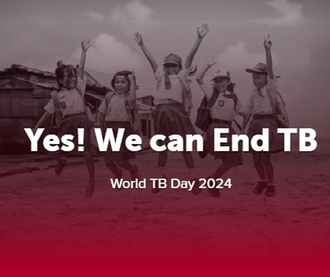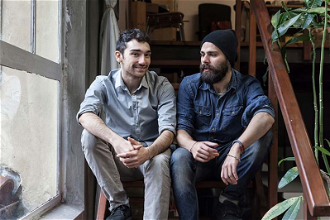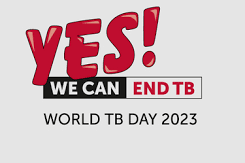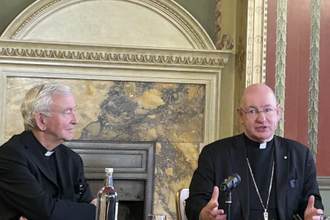The drugs aren't working - World TB Day 2024

Set in 1969 in East London, series 13 of Call the Midwife has just finished on BBC television. A BBC announcer prefaced one programme with: "Now for a healthy dose of nostalgia with Call the Midwife". There then followed a drama in which a whole family is struck down with tuberculosis and Nurse Nancy learns that her mother took her to an orphanage because they were a 'tubercular family' where none of the members lived to old age. Sadly, this 'healthy' dose of 'nostalgia is still being lived out by many in 2024. TB is an infectious disease that has existed for over 5,000 years. It is the world's highest infectious disease killer surpassing COVID-19. World TB day on 24 March is a moment to remember that tuberculosis (TB) is a complex disease that still affects over 10 million people worldwide every year.
In Singapore Eloisa 'Louie' Zepeda Teng is 41 years old, a wife and a mother of two children. In 2006 while working as an architect she contracted TB resulting in her being put on a six-month course of toxic drugs. Soon the doctors realised that the drug cocktail she was taking was not working and was actually causing brain injury which resulted in Louie losing her sight. But worse was to come Louie was then diagnosed with drug resistant tuberculosis. She started a gruelling 24 month course of tablets and painful injections which caused vomiting, bone aches and other symptoms. Louie said, "There was a distinct lack of knowledge of drug-resistant strains of TB within the medical community during this time, partly due to a lack of diagnostic tools."
The emergence of drug resistance variants has been a problem since the first antibiotics were used against the pathogen in the 1940s. It occurs when the drugs are given incorrectly, taken erratically, or halted before the bacteria has been killed. Today anti-microbial resistant disease (AMR) is is one of the top global public health and development threats. It is estimated that bacterial AMR was directly responsible for 1.27 million global deaths in 2019 and contributed to 4.95 million deaths. In September 2024 the United Nations will hold a high-level meeting on AMR. It is a vital moment for governments to address the AMR crisis and to make this happen, political pressure is needed. World TB Day (24 March) is an opportunity to raise concerns about the impact of drug-resistant TB on the global AMR crisis.
TB is closely linked with poverty, overcrowded living conditions, undernutrition and poor access to healthcare. Inadequate healthcare infrastructure, limited access to diagnostic tools, and challenges in implementing effective treatment and prevention programs hinder TB control efforts in many regions. The stigma associated with TB can lead to delays in seeking diagnosis and treatment, the loss of employment and housing, as well as social isolation of individuals affected by the disease. A lack of political will and funding for TB research and development is further impeding progress to end TB by 2030.
Addressing the social and economic complexities of TB requires an equity approach that integrates healthcare interventions with broader efforts to tackle poverty, inequality, stigma, and structural barriers to health access. Governments must take coordinated action with a shared goal of prioritising health equity in all policies, adopting a whole of society approach.
Pope Francis would agree. In his 8 January 2024 message to the annual meeting of the World economic forum he asked, "How is it possible that in today's world people are still dying of hunger, being exploited, condemned to illiteracy, lacking basic medical care, and left without shelter?
While later in January, addressing the Participants in the International Conference: 'The Declaration of Helsinki: Research in Resource-Poor Settings', Pope Francis said: "We are faced, then, with challenges that give rise to questions of global justice concerning healthcare. In this area, after the experience of the pandemic, we have seen how important it is to provide forms of governance that go beyond those available to individual nations. In this regard, we need to foster a way of thinking about the international community that effectively serves the human family, turning to a perspective of social friendship and universal fraternity (cf. Fratelli Tutti, 173).' For 'We cannot subordinate care, which represents the essential attitude that allows human life to progress through the entrusting of one person to another, to the reductive mentalities of the market and of technology'."
While England remains a low-incidence country for tuberculosis, progress towards elimination has stalled in recent years. Between 2000 and 2010 a multifaceted health inequalities strategy was implemented in England. The policies led to reductions in social inequalities in housing, access to healthcare and educational attainment, with an overall reduction in health inequalities. Once the strategy ended, health inequalities started to rise again. This shows the importance of continuing activities that have been successful, that go beyond political cycles and should be embedded within long-term planning within government policy, regardless of what party is in power. TB is no respecter of borders and clearly the UK Government must address the growing threat of drug-resistant TB.
In the UK TB is more common and those in large urban areas in England which are associated with higher levels of deprivation. Data from the UK Health Security Agency indicates that cases of TB in England increased by 7% in the first half of 2023 compared to the same timeframe in 2022, with 2,408 notifications compared to 2,251 in the first 2 quarters of 2022. Dr Esther Robinson, Head of the TB Unit at UK Health Security Agency, said: 'TB is curable and preventable, but despite significant progress towards elimination in recent years, the disease remains a serious public health issue in the UK.'
Results UK's recent report, 'Stigma kills why medicine alone won't end tuberculosis' has this to say: "A whole of society approach builds the resilience of communities to better withstand threats to their health and well-being. The positive impact of health equity extends beyond individual well-being; it influences economic productivity, social cohesion and the overall development of nations. A commitment to addressing health inequalities fosters a society where every individual has the opportunity to thrive, contributing to a more just and sustainable future and ensuring no one is left behind."
in 2020 Louie launched a TB survivors' group - TBPeople Philippines. The mission of the organisation is to address the stigma that is associated with TB and lessen the negative experiences people with TB face due to discrimination. Louie and many others look forward to the day when we can all look back with pride that we have eliminated this deadly disease from our planet.
LINKS
Stigma kills: Why medicine alone won't end tuberculosis:
https://results.org.uk/publication/stigma-kills-why-medicine-alone-wont-end-tuberculosis/
Advocate to end TB: www.stoptb.org/advocate-to-endtb/world-tb-day
The Declaration of Helsinki: Research in Resource-Poor Settings: www.osservatoreromano.va/en/news/2024-01/ing-004/we-cannot-subordinate-care-to-the-reductive-mentalities-of-the-m.html


















